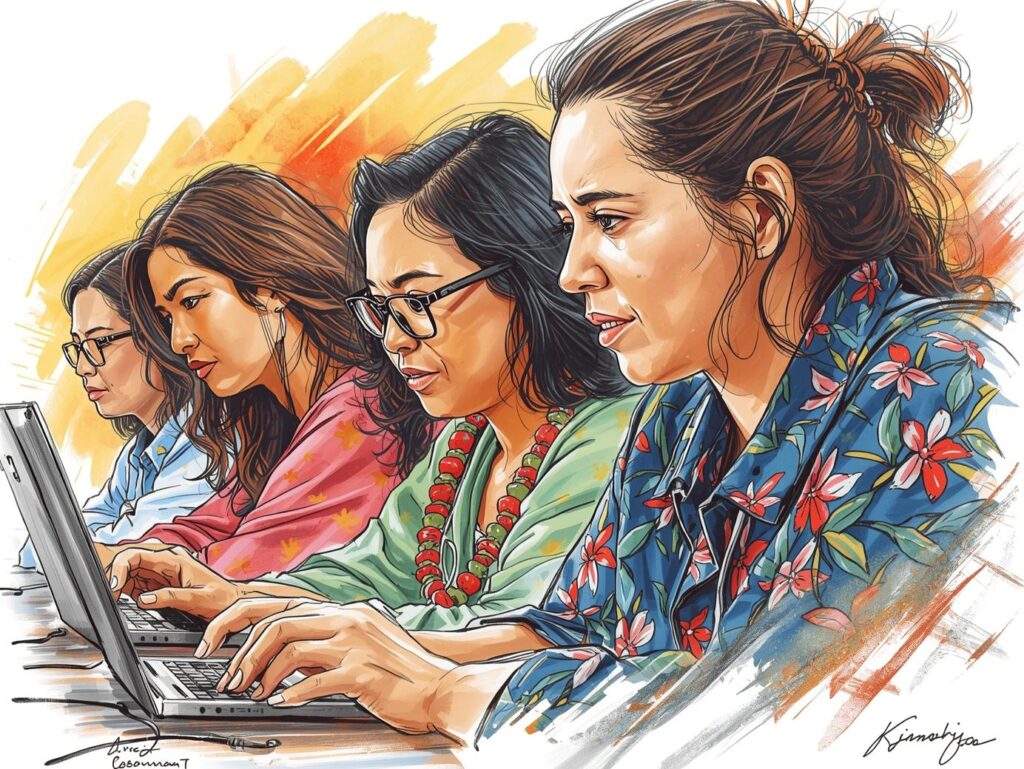Introduction
The digital era is transforming economies, societies, and communities worldwide. Yet, women remain underrepresented in science, technology, engineering, and mathematics (STEM), as well as in leadership roles in innovation and entrepreneurship. Closing this gap is not just a matter of fairness—it is a necessity for inclusive development and sustainable progress.
At CHUYA SONCCO, we believe that empowering women in technology is key to building resilient communities, driving innovation, and ensuring social equity. By fostering access, skills, and leadership opportunities, women become change agents capable of shaping the digital and technological landscape in Peru and beyond.

Why Women in Technology Matter
1. Economic Empowerment
- Women in tech contribute to economic growth, entrepreneurship, and job creation.
- Digital skills enable women to access remote work, launch startups, and participate in the global economy.
2. Innovation and Problem Solving
- Diverse teams are more innovative and effective in solving complex problems.
- Women bring different perspectives to technology, design, and product development.
3. Social Transformation
- Empowering women in STEM has a multiplier effect on families and communities.
- Female leaders inspire younger generations, fostering a culture of education, resilience, and ambition.
4. Closing the Gender Gap in Technology
- Globally, women make up less than 30% of STEM professionals.
- Without targeted initiatives, technological advancement risks perpetuating gender inequalities.
Challenges Facing Women in Technology
1. Cultural and Social Barriers
- Stereotypes about gender roles discourage girls from pursuing STEM careers.
- Family and community expectations can limit opportunities for education and career development.
2. Limited Access to Education and Resources
- In rural and marginalized areas, girls often lack access to computers, internet, and STEM programs.
- Scholarships and mentorship programs are essential to bridge this gap.
3. Workplace Bias and Underrepresentation
- Women face career obstacles, unequal pay, and fewer leadership opportunities.
- Representation in decision-making roles remains low across tech sectors.
4. Retention Challenges
- Women are more likely to leave STEM careers due to lack of support, mentorship, or inclusive policies.
Global Best Practices
United States – Girls Who Code
- Provides coding education and mentorship to tens of thousands of girls annually.
Africa – Women in Tech Initiatives
- Programs focus on entrepreneurship, digital skills training, and leadership.
Latin America – Peru, Mexico, Brazil
- Scholarships, hackathons, and networks for women in tech are emerging.
- Emphasis on rural inclusion and addressing socio-cultural barriers.
The Role of CHUYA SONCCO
CHUYA SONCCO’s strategy for empowering women in technology and innovation includes:
- STEM Education Programs for Girls
- Workshops, coding bootcamps, robotics labs, and digital literacy courses.
- Mentorship and Leadership Development
- Pairing young women with female professionals in technology, healthcare, and innovation.
- Scholarships and Access to Technology
- Providing laptops, internet access, and scholarships to underserved communities.
- Innovation Labs and Competitions
- Encouraging young women to design solutions for social challenges, from healthcare to sustainability.
- Advocacy and Policy Engagement
- Working with governments, private sector, and civil society to promote inclusive policies and gender equity in STEM fields.
Inspiring Change Agents
Women who engage in technology and innovation become leaders, educators, and entrepreneurs. They inspire others, create opportunities, and strengthen the social fabric of their communities. By equipping them with skills, networks, and resources, CHUYA SONCCO ensures that women are not only participants in the digital era but drivers of transformation.
Conclusion
Empowering women in technology is a strategic, social, and ethical imperative. Inclusive innovation enhances creativity, equity, and resilience, while creating a more just and sustainable society.
At CHUYA SONCCO, we are committed to building programs, partnerships, and pathways that allow women to thrive as technology leaders and change agents. By fostering digital skills, mentorship, and leadership opportunities, we aim to inspire a generation of women who will shape the future of innovation, education, and social development in Peru and beyond.





